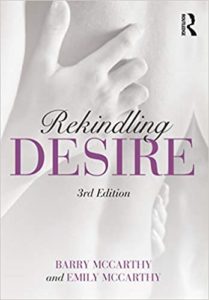Rekindling Desire (3rd Ed.) by Barry and Emily McCarthy
Rekindling Desire (3rd Ed.)
by Barry and Emily McCarthy
Reviewed by Mac Marshall, PhD
“The most disruptive sexual problem is low desire.”
Do you find that you have little desire for sex with your partner? As a couple do you have sex only a few times a year, if at all? Does one of you want more sex than the other, resulting in arguments, recrimination, blame, and hurt feelings? Are you convinced that your “sex light” has gone out? Do you wonder how to bring back intimacy in a marriage? To rekindle desire is to revitalize, reawaken, and reignite it, and that is the focus of Rekindling Desire (3rd Ed.) by Barry and Emily McCarthy. Their motivation for writing this book is to provide “new insights, support, and hope for couples facing desire problems, a no sex or low sex relationship, and desire discrepancy.”
In our youth and young adulthood, most of us experience spontaneous desire, driven by our hormones. Typically as we age, the hormonally triggered desire for sex becomes less pressing. Many people begin to feel less sexy, less desirous, in and beyond their 40s. That doesn’t have to be the end of sex! We can revivify the relationship by understanding “responsive desire.” Learning to give each other sensual pleasure, including plenty of touching, will stimulate responsive desire for sex in both partners.
Rekindling Desire will be of particular help to those in low-desire relationships, or to couples where there is a discrepancy in desire, with one person pursuing sexual connection while the other distances. It offers thorough explanations of what sex therapists have found to be effective for resolving sexual problems and dysfunction resulting from low desire.
This 247-page book is organized into three parts: Awareness (5 chapters), Change (6 chapters), and Relapse Prevention (4 chapters):
- When and Why Couples Lose Sexual Desire. “Desire problems can occur among all types of couples and all age groups.”
- Whose Problem Is It? Hers, His, or Ours? “Sexual desire and desire problems are best understood as a couple issue.”
- Turnoffs: Poisons for Sexual Desire. “A myriad of psychological, bio-medical, and social/relational factors can poison desire.”
- Finding Your Voice: Celebrating Female Sexuality. “The biggest mistake people make is to define female sexuality narrowly. Sex does not equal intercourse. Sexual satisfaction does not equal orgasm.”
- The New Male Sexuality: Confronting Autonomous Sex Performance. “For the great majority of males…sexual dysfunction causes low desire. The main male sexual dysfunctions are premature ejaculation (PE), erectile dysfunction (ED), and ejaculatory inhibition.”
- Being an Intimate Sexual Team: Discovering Your Couple Sexual Style. “Your couple sexual style has two dimensions: first, how to balance each person’s sexual autonomy (“sexual voice”) with being an intimate sexual team; second, how each couple sexual style integrates intimacy and eroticism.”
- Building Anticipation: Bridges to Sexual Desire. “The prescription for sexual desire is positive anticipation, an emotionally intimate relationship, nondemand pleasuring, erotic scenarios and techniques, sharing orgasm, feeling emotionally bonded and satisfied, and maintaining a regular rhythm of sexual contact.”
- Attachment: Enhancing Intimacy. “The essence of intimacy is feeling emotionally open, securely attached, and personally valued.”
- Nondemand Pleasuring: Let’s Play Touchy-Feely. “Pleasuring includes affectionate, sensual, and playful touch, both inside and outside the bedroom.”
- Challenging Inhibitions and Avoidance: Be Sexually Present. “It is both an individual and couple task to increase awareness and challenge inhibitions.”
- Creating Erotic Scenarios: Vital Sexuality. “The essence of eroticism is scenarios and techniques that increase anticipation, subjective and objective arousal, and erotic flow. This includes, but is not limited to, intercourse.”
- Maintaining Gains: Keeping Sexuality Vital and Satisfying. “The core of relapse prevention is awareness that intimacy and sexuality need continual time and energy.”
- Intimate Attachment: Enhancing Your Bond. “Intimacy dates are a powerful resource for preventing relapse and reinforcing relational satisfaction.”
- The Erotic Marriage: Lusting for Life. “You need to challenge routine and mechanical sex, which is a death knell for desire. Eroticism….must be actively cultivated.”
- Valuing a Satisfying, Secure, and Sexual Relationship. “Commit to maintaining a vital sexual bond. Try to go no longer than 2 weeks without some kind of sexual contact. Sex cannot be taken for granted or treated with benign neglect.”

Each chapter is packed with information and also includes a case study, an exercise, a summary, and key points. This is a book you’ll want to study, not read quickly.
In Barry and Emily McCarthy’s view, rekindling desire relies heavily on a couple’s ability to engage in frank, clear, nonjudgmental communication. They see their book as an adjunct to therapy for those who wish to reawaken intimacy and passion in their relationship. “This is a book of ideas, guidelines, and exercises, not a ‘do it yourself’ therapy book,” they state. “It is not a substitute for sex, couple, or individual therapy.”
Barry McCarthy, PhD is a professor of psychology at American University, a diplomate in clinical psychology, a diplomate in sex therapy, and a certified couple therapist. He is the author of over 100 articles, 33 book chapters and 21 books. He has presented over 450 professional workshops nationally and internationally. He received the SSTAR Masters and Johnson award for lifetime contributions to the sex therapy field.
certified couple therapist. He is the author of over 100 articles, 33 book chapters and 21 books. He has presented over 450 professional workshops nationally and internationally. He received the SSTAR Masters and Johnson award for lifetime contributions to the sex therapy field.
Emily McCarthy received a B.S. degree in speech communication, and her writing and wisdom provides a balanced humanistic perspective. This is Barry and Emily’s 14th co-authored book. They have been married for 52 years.
Purchase Rekindling Desire (3rd Ed.)
================

Mac Marshall, PhD is a retired anthropology professor, researcher, and author who is delighted to explore sexuality studies at this time of his life.